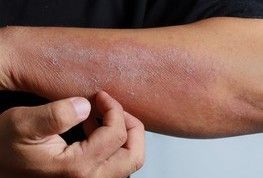Article
Biologics for Inflammatory Skin Disease Accepted During COVID-19 Pandemic
Author(s):
Investigators believed the immunosuppressive qualities of these biologics posed no additional risk in contracting the COVID-19 virus, but added that additional research is warranted.

In the beginning of the COVID-19 pandemic, it was unknown whether biologics should be discontinued due to their immunosuppressive effects. However, a recent study from Japan suggested that the use of biologics for patients with inflammatory skin diseases was safe to use amidst a COVID-19 infection.
However, the investigators called for further observation to confirm the risks and benefits of biologic use during the ongoing pandemic.
The team, led by Koji Kamiya, MD, PhD, Department of Dermatology, Jichi Medical University, noted recent advancements in biologics for treatment of inflammatory skin diseases such as psoriasis, palmoplantar pustulosis, atopic dermatitis, and hidradenitis suppurativa. Over 10 biologics have been available for psoriasis alone.
Prior to the study, it was unknown whether the immunosuppressive qualities of these biologics put patients at an increased risk of the COVID-19 virus.
This prompted Kamiya and colleagues to analyze the trend of biologic use for the inflammatory skin diseases listed above during the COVID-19 pandemic.
The Methods
The study was conducted at the Jichi Medical University in Japan, and all patients with inflammatory skin diseases who received biologic therapy between January 1, 2020, and February 28, 2021 were enrolled.
A total of 227 patients were included in the study.
For psoriasis patients, of which there were 131 cases, the severity of skin lesions was evaluated using the Psiorasis Area and Severity Index (PASI).
For the patients with palmoplantar pustulosis, the severity was evaluated using the PPP Area and Severity Index (PPPASI). The severity of atopic dermatitis was evaluated via the Investigators’ Global Assessment (IGA) and Eczema Area and Severity Index (EASI), while those with hidradenitis suppurativa were evaluated with the Hurley clinical grading system.
Discontinuation and Introduction
During the observation period, bioswitch was performed in 25 patients with psoriasis (11%) due to insufficient effects.
Biologics were discontinued in 14 patients with psoriasis (6.2%), and introduced in 27 patients. For patients with palmoplantar pustulosis, guselkumab was not discontinued during the observation period, and was introduced and observed in 4 patients.
Additionally, dupilumab was discontinued for 10 patients (14.5%) with atopic dermatitis, and observed in 33 patients (47.8%), while adalimumab was discontinued in 4 male patients with hidradenitis suppurativa and introduced in 2 male patients (40%).
During the study, 1 male patient who received adalimumab treatment suffered from the COVID-19 virus and recovered after 7 days. He was successfully treated with adalimumab during this time. No cases of COVID-19 were observed by investigators after bioswitch or treatment initiation.
Though the initiation of biologics appeared safe during the study, Kamiya and colleagues addressed several limitations including limited data and it being a single-center study.
Additionally, many limitations regarding the use of biologics during the pandemic still exist in Japan, and some patients have remained skeptical over the safety and efficacy of biologics, which prompted the investigators to call for more research.
“The use of biologics seemed safe for use amidst COVID-19 infection during the observation period,” the team wrote. “However, further observation on a larger number of patients is required to confirm the risks and benefits of biologic use in the COVID-19 era.”
The study, “Single-center survey of biologic use for inflammatory skin diseases during the coronavirus disease 2019 pandemic,” was published online in The Journal of Dermatology.




